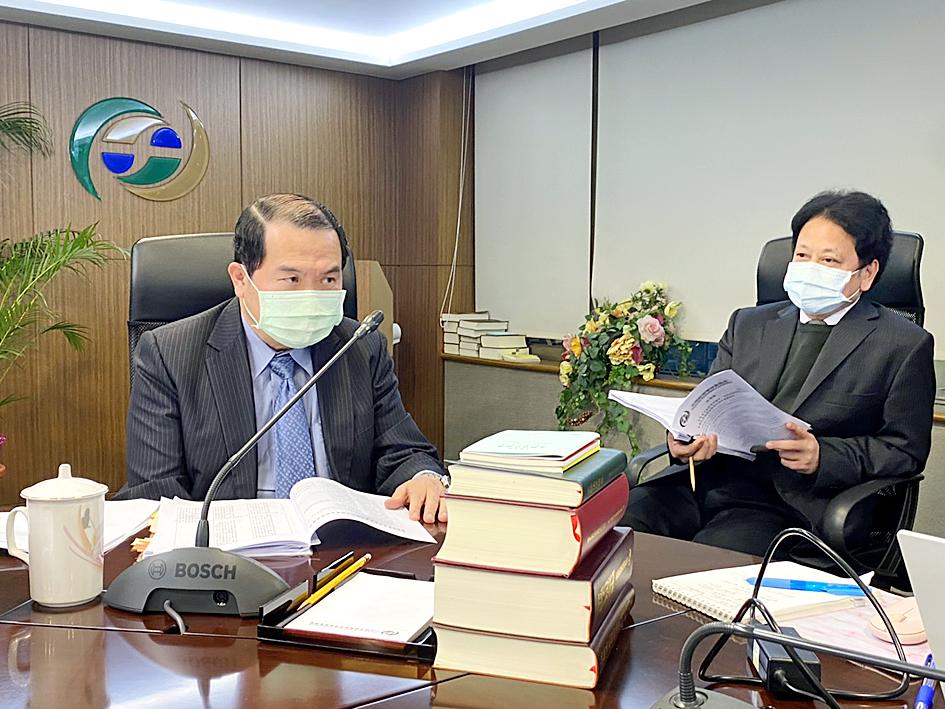The maximum reward for people who report financial crimes would be raised to NT$4 million (US$140,701) next week, a 10-fold increase to encourage whistle-blowers, the Financial Supervisory Commission (FSC) told a news conference in New Taipei City yesterday.
The maximum reward would be given to people who provide information that helps the commission uncover financial crimes in which companies or individuals are fined at least NT$10 million or sentenced to a minimum of three years in prison, FSC officials said.
The cap of NT$400,000 was increased in line with the commission’s goal of providing greater incentives for reporting, Financial Examination Bureau Deputy Director-General Chang Tzy-hao (張子浩) said.

Photo: Kao Shih-ching, Taipei Times
If a whistle-blower exposes a less-serious crime — where individuals or companies are fined between NT$5 million and NT$10 million, or sentenced to one year to three years in prison, they would receive NT$2 million, also 10 times the current reward, Chang said.
Rewards of NT$250,000 would be given for information leading to fines of between NT$1 million and NT$5 million, or jail terms of less than one year, he said, adding that this level is five times higher.
For lower-level crimes drawing fine of between NT$200,000 and NT$1 million, whistle-blowers would receive NT$50,000, also five times higher than the current amount, he said.
The commission last year issued a total of NT$305,000 in rewards to seven whistle-blowers, up from NT$50,000 in 2018 and NT$155,000 in 2019, it said.
It has paid NT$2.32 million in rewards since the program began, the FSC said.
The biggest single-case reward was NT$200,000, it said.
“There is a lot of room for increases in reporting on financial criminal activities,” Chang said.
Whistle-blowers can be internal or external to a company or institution, he said.
The commission would investigate information provided by anonymous whistle-blowers, but would not issue rewards in such cases, he said.
“A few anonymous whistle-blowers claimed rewards after reporting companies that were fined or sentenced. We verified their identity and paid them, as the information was helpful.” Chang said. “However, after next week’s increase in rewards, we would no longer pay out on anonymous tips.”
Most of the reports it has received in the past few years have been connected to illegal activities in securities investment consulting, he said.

South Korea’s equity benchmark yesterday crossed a new milestone just a month after surpassing the once-unthinkable 5,000 mark as surging global memory demand powers the country’s biggest chipmakers. The KOSPI advanced as much as 2.6 percent to a record 6,123, with Samsung Electronics Co and SK Hynix Inc each gaining more than 2 percent. With the benchmark now up 45 percent this year, South Korea’s stock market capitalization has also moved past France’s, following last month’s overtaking of Germany’s. Long overlooked by foreign funds, despite being undervalued, South Korean stocks have now emerged as clear winners in the global market. The so-called “artificial intelligence

CONFUSION: Taiwan, Japan and other big exporters are cautiously monitoring the situation, while analysts said more Trump responses ate likely after his loss in court US trading partners in Asia started weighing fresh uncertainties yesterday after President Donald Trump vowed to impose a new tariff on imports, hours after the Supreme Court struck down many of the sweeping levies he used to launch a global trade war. The court’s ruling invalidated a number of tariffs that the Trump administration had imposed on Asian export powerhouses from China and South Korea to Japan and Taiwan, the world’s largest chip maker and a key player in tech supply chains. Within hours, Trump said he would impose a new 10 percent duty on US imports from all countries starting on

Chinese artificial intelligence (AI) start-up DeepSeek’s (深度求索) latest AI model, set to be released as soon as next week, was trained on Nvidia Corp’s most advanced AI chip, the Blackwell, a senior official of US President Donald Trump’s administration said on Monday, in what could represent a violation of US export controls. The US believes DeepSeek will remove the technical indicators that might reveal its use of American AI chips, the official said, adding that the Blackwells are likely clustered at its data center in Inner Mongolia, an autonomous region of China. The person declined to say how the US government received

Like many of us who are mindful of our plastic consumption, Beth Gardiner would take her own bags to the supermarket and be annoyed whenever she forgot to do so. Out without her refillable bottle, she would avoid buying bottled water. “Here I am, in my own little life, worrying about that and trying to use less plastic,” she says. Then she read an article in this newspaper, just over eight years ago, and discovered that fossil fuel companies had plowed more than US$180 billion into plastic plants in the US since 2010. “It was a kick in the teeth,” Gardiner